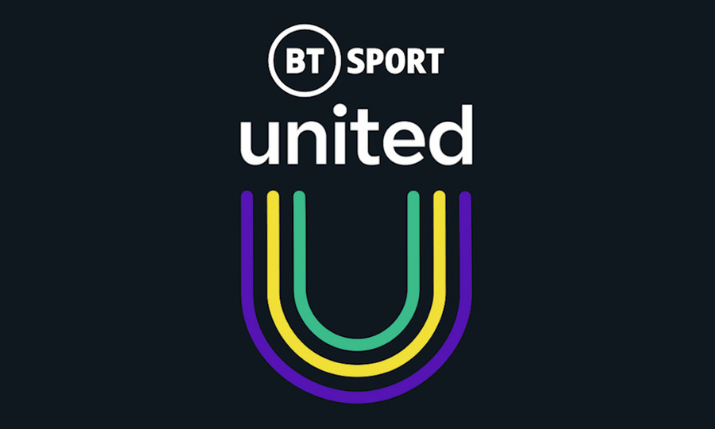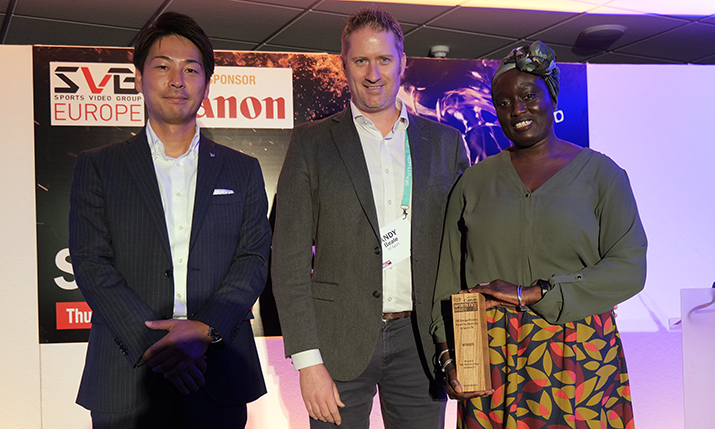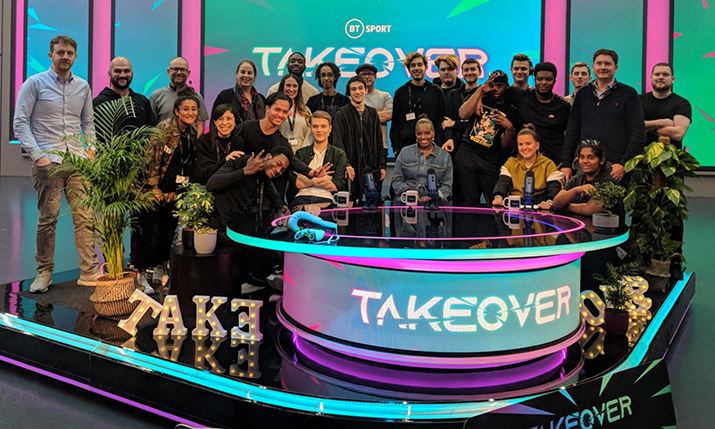Sports TV Awards Winner: Creating a movement for change in sports broadcasting with BT Sport United
 BT Sport won the SVG Europe Women Award for Diversity in Sports TV with the United Initiative that was launched during the pandemic in 2020. BT Sport United brings together a number of initiatives within and outside of BT Sport, providing an umbrella for people to gather under and to help do more to increase diversity and inclusion in the sports broadcasting industry.
BT Sport won the SVG Europe Women Award for Diversity in Sports TV with the United Initiative that was launched during the pandemic in 2020. BT Sport United brings together a number of initiatives within and outside of BT Sport, providing an umbrella for people to gather under and to help do more to increase diversity and inclusion in the sports broadcasting industry.
BT Sport United’s aims are focused on the three pillars of community, inclusivity and sustainability, for, “with privilege comes responsibility, and with unity comes opportunity”. It currently encompasses several initiatives, including BT Sport Takeover, where the broadcaster works with an East London college to enable students to create a BT Sport show, and School 21, where students from many backgrounds are given authentic problems to solve, as well as being a founding partner of Rise Up, an initiative inspiring girls to come into the industry.
Nine years in the making
Speaking to SVG Europe, Hindhaugh says that BT Sport United is the culmination of initiatives that have been nine years in the making. He explains: “I launched BT Sport United in August 2020 from the BT Sport’s studio between lockdown one and lockdown two. It was a way of us bringing together all of our different strands around community, sustainability and inclusivity, to give it a more coherent meaning.”
“It’s all about making sure that we are seen as an open industry where there is opportunity for all. I think it’s that simple, to be honest”
On the award, he says: “You don’t realise how much the award means to me and to our team. We were really choked about it because we’re not the biggest broadcaster; we haven’t got the most money. But I think seeing what we’re doing on air, combined with this much more structured BT Sport United approach, I think is really exciting because we’re not trying to do everything, but we’re doing stuff that’s really meaningful. I think it was great recognition for the team to get the award.”
As to why these kind of initiatives are vital for the sports broadcasting industry, Hindhaugh says: “It’s important because we need a pipeline. As an industry, we need to be attracting the best and most gifted talent, and as an industry, the important thing is if the production team doesn’t reflect the audience we’re talking to, the conversation will be wrong. Our audience is changing both in demographic, gender and ethnicity, as the country changes, and if we don’t engage the right people to have that right inclusive team, we will start losing touch with our audiences. Secondly, I think the industry will start to really struggle with some key roles, I mean, we’ve already that flagged in the past, which is why Rise Up is so important for engineering roles. This is about us as an industry, for all of us create to an opportunity.”

BT Sport’s chief engineer, Andy Beale [centre], and Fatou Jeng, principal, broadcast regulation, receiving the SVG Europe Women Award for Diversity in Sports TV
On creating opportunities, Hindhaugh says: “BT Sport United [gives us the ability] to really double down on working within our community and with the industry, because I still firmly believe our industry isn’t open enough,” notes Hindhaugh. “I still think, if you look at our industry – and I’m seeing it more and more – it’s becoming quite aging in places. There are a lot of specialisms where you’re looking and thinking, ‘where are the new people coming through?’.”
Working with the immediate community around the BT Sport Stratford studios has been a “conscious decision,” says Hindhaugh. “We are in Newham, the poorest borough in London. We are in an area where I was always very conscious that there was a danger of us creating the ‘Sun City’ of Stratford with all these people travelling through the community to work at BT Sport, and if we don’t come from the community, then we don’t give anything back to that community or create an opportunity. Over the years, more of our people have moved this way. We have employed more and more local people and are working with our local communities, but it’s easy when you’re in a community that’s very diverse and has a lot of challenges around poverty and people in unstructured surroundings, but it works for us and it’s something I’m really proud of.”
He goes on: “Since I launched BT Sport, I’ve had two apprenticeship programmes [focused on the six London boroughs directly impacted by the 2012 London Olympics]. We’ve had 12 people come through, nine of them still work for us, one now works for Channel 4, one works for ITV, and one of them now has just left us to be a full-time standup comedian and presenter. And they all joined us on entry-level roles.
“I’m really proud of two of our apprentices going to work for other broadcasters because we’ve bought people through and they’re finding their way. It’s all about making sure that we are seen as an open industry where there is opportunity for all. I think it’s that simple, to be honest,” he adds.
Hindhaugh goes on to comment on the successes of Takeover: “What we’re doing with things like Takeover is we are creating a future pool. And some of the people that have worked at Takeover, one of them is now on a media studies course through Here East and they won that position because of what they did with us, and a couple of them have worked for us as runners or with one of our partners. So we starting to see that full 360 coming through, and we’re just touching the iceberg.”

BT Sport Takeover’s team for 2020, where the broadcaster works with an East London college to enable students to create a BT Sport show
New projects for 2022
He adds: “I think we struggle a little bit with people understanding what the opportunities are within the industry, but also people are realising that they would like to come into our industry, and that’s where the likes of School 21 and Takeover really come into their own.”
To that end, Hindhaugh is working on some new projects at BT Sport that will give community groups opportunities to understand and identify what a broadcaster does and therefore how they too could have careers.
“There’s lots of challenges but as an industry, we need to embrace it. I think one of the things we do need to do is maybe celebrate a bit more what each of us does, not as competition, but looking at where there are shared learnings and looking at how we can – as an industry – come together”
One of the programmes in planning right now is a training scheme that will be split between two local Borough of Newham-based organisations, with the first round for two people covering a full week in May, and the next one being one day a week over five weeks for the other two. All four people will be paid during this tailored work experience.
Hindhaugh comments: “The programme I’m working on at the moment is for disadvantaged teenagers, between the ages of 16 to 18. We’re taking on four people at a time [and the idea is that] before they get proper work experience, [this programme] is shaped to a personal level [to find out] what their aspirations and ambitions are. What I like about it is being able to meet with them and tailor the training for them, because that will make them feel empowered that makes them feel involved, rather than just being told ‘you go and do that for day, and then you’ll do that for the day’. We’re looking to make that a revolving opportunity. What it does is create that halo effect, of saying to people in similar positions, there are opportunities.”
He goes on: “It’s not about being a graduate. For me, it’s about people having the right aptitude and the right attitude, and you almost don’t need anything else. These programmes we’re designing, are twofold because [as well as helping young people] my teams really benefit from mentoring, from taking people under their wing and from sharing their experiences; it actually develops them, as people.”
BT Sport’s own voice
He adds that creating this United brand has also been a large step in the broadcaster’s ability to have its own ‘voice’. He says: “I think what we learned with Black Lives Matter last year was that it’s okay for us to have an opinion other than showing live sport, and that was a big step forward for us as a sports broadcaster. If you look at what we do around Black History Month now compared to what we were doing two years ago, which was nothing, and you look at our sustainability stuff that we’re putting out at the moment, and you look at what we’re doing with Takeover, it’s really interesting to see the impact that BT Sport United’s had in enabling us to have the confidence to have an identity and to have an opinion, but also thrive in that internal advocacy, and that’s been really powerful for us; really, really powerful.”
Hindhaugh says that the internal aspect of BT Sport United is also very important: “I think we all recognise now that people judge their employer, not just by what they get paid for, but by their actions. I think there is an expectation – quite rightly – for employers to have a soul and to have meaning, and that the people who work with them have something to identify with, and those three pillars – community, inclusivity and sustainability – are really important.”
He adds: “BT Sport United is the BT Sport community. I lead the inclusivity stream, Fergus [Garber, director of production] leads our sustainability stream, and we have volunteers internally that get involved in shaping what we do. So it really is the people at BT Sport that are influencing what we do, where we do it and why we do it. It’s a real internal community thing.”
Facing challenges with energy
Hindhaugh adds that he would like to be able to work more closely with other broadcasters, to share best practice. “There’s lots of challenges but as an industry, we need to embrace it. I think one of the things we do need to do is maybe celebrate a bit more what each of us does, not as competition, but looking at where there are shared learnings and looking at how we can – as an industry – come together without putting constraints on each broadcaster. [What I can do is] put energy behind [ideas] and throw people towards it because my guys really want to get involved in this stuff.”
BT Sport United is now looking ahead to a full calendar of activities over 2022, ranging from sustainability month to Black History month, and LGBTQ+ month. Hindhaugh says: “It’s just some content and programming that helps educate our audiences, but also helps ourselves understand some of the challenges that are faced. The things I want to really push on are things that maybe we don’t address enough, so we’re going to focus a bit more on disability.
“We did the Disability Cup [this year], the most inclusive broadcast ever, and we’re doing that again in June, but also – and I doff my cap to Channel 4 because I think they’ve led the way on this by a country mile, but it doesn’t mean we shouldn’t also be looking at what we’re doing – I’m also doing a lot of work on access services around the model we did for the Disability Cup. We’ll be doing a Premier League game soon with those different variations, to be the most inclusive Premier League game ever broadcast, and I want that as standard within the next two or three years. I want everything we do to have all of that audio description, all of that signing, subtitling, the lot.”
Finally, Hindhaugh concludes: “The United initiative has made BT Sport closer as a community post-COVID, than pre-COVID. It’s because people thinking about this United and the communication is so much clearer, and we now have opinion, we now care about things in a way that we’re proud to talk about as an organisation. So watch this space because I think United will grow; I certainly want it to.”
